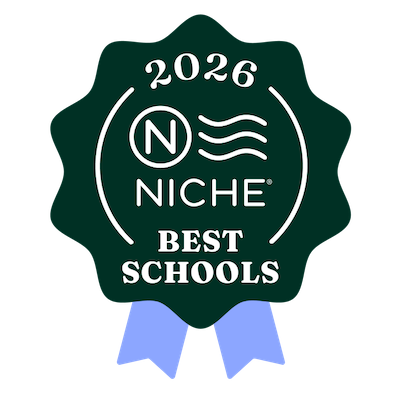Curriculum Detail - Grade 4
Fourth Grade
Fourth Grade Curriculum-at-a-Glance
During the Fourth Grade year, girls explore leadership and action , perspectives and interdependence. The place-based curriculum guides them to become independent learners who work with accuracy, are metacognitive, and participate as citizen leaders in our outdoor learning environment at the Butler Campus. Civic engagement in the community through stewardship contributions and leadership opportunities highlighting adventure and mindfulness strategies prepare students for greater involvement and service beyond Laurel. Students take part in many discussions and small-group projects that help them develop an articulated set of leadership attributes, such as courage, compassion, resourcefulness and curiosity. Girls apply the components of resilience, including creativity, growth mindset, purpose, self-care and relationships, throughout the year. An emphasis on reading and writing in all areas of the curriculum helps students learn to apply strategies to understand new texts, to reason well and to communicate their thoughts clearly. Balanced with rigorous mathematics and science curricula, students participate in a fully integrated STEAM-focused experience called Power & Purpose and are engaged in hands-on learning through intensive research, field studies and an engineering and building project that benefits the entire campus community. As students ride bikes across our 150-acre Butler Campus each day, they embrace independence, solve meaningful problems, and learn more about the historical significance of bicycles for women and the current impact of bicycles on our environment.
3-5 Curricula
In Grades 3-5, our interdisciplinary curriculum is inspired by findings from Laurel’s Center for Research on Girls. Grade-level themes shape deep investigations of big ideas and help girls strengthen their understandings by connecting learning in each subject. In addition to thought-provoking integrated themes, students in Grades 3-5 are immersed in the big systems thinking that comes from time spent learning in and about our natural world.
Faculty
-
 James AguilarPrimary School Math SpecialistEducation: University of Phoenix - B.S.Hired: 2022
James AguilarPrimary School Math SpecialistEducation: University of Phoenix - B.S.Hired: 2022 -
 Melynda ByrnesDirector of STEAM Education, K-5; STEAM TeacherEducation: University of Utah - B.S.
Melynda ByrnesDirector of STEAM Education, K-5; STEAM TeacherEducation: University of Utah - B.S.
Vassar College - B.A.Hired: 2009 -
 Emily FeldermanVisual Art Teacher, Primary SchoolEducation: Case Western Reserve University - B.S.Hired: 2006
Emily FeldermanVisual Art Teacher, Primary SchoolEducation: Case Western Reserve University - B.S.Hired: 2006 -

-
 Shannon LukzAssociate Director of Primary School, Grades 3-5 and Outdoor PreKEducation: Miami University - B.S.
Shannon LukzAssociate Director of Primary School, Grades 3-5 and Outdoor PreKEducation: Miami University - B.S.
Western Michigan University - M.AHired: 2005 -
 Kathryn MasarykFourth Grade TeacherEducation: California Polytechnic State University - B.S.Hired: 2021
Kathryn MasarykFourth Grade TeacherEducation: California Polytechnic State University - B.S.Hired: 2021 -

-
 Abigail Murphy '04Librarian, Grades 1-5Education: Brown University - M.A.
Abigail Murphy '04Librarian, Grades 1-5Education: Brown University - M.A.
Yale University - B.A.
National University of IrelandHired: 2020 -
 Bella PatelDirector of Early Childhood and Primary SchoolsEducation: Vassar College - B.A.
Bella PatelDirector of Early Childhood and Primary SchoolsEducation: Vassar College - B.A.
Teachers College, Columbia University - M.A.Hired: 2003 -
 Ilissa PearlmanSchool Psychologist, Grades K-5Education: University of Michigan - B.A.
Ilissa PearlmanSchool Psychologist, Grades K-5Education: University of Michigan - B.A.
Ohio State University - M.A.
Ursuline College - M.A.
Case Western Reserve University - Ph.D.Hired: 2005 -
 Lindsay PenkalaLaurel@Butler TeacherEducation: University of Dayton - B.S.Hired: 2022
Lindsay PenkalaLaurel@Butler TeacherEducation: University of Dayton - B.S.Hired: 2022 -
 Karen RedmondTechnology Innovation Specialist & Maker MentorEducation: Kent State University - B.A.
Karen RedmondTechnology Innovation Specialist & Maker MentorEducation: Kent State University - B.A.
Ohio State University - M.A.
Ursuline College - M.Ed.
Baldwin Wallace CollegeHired: 2002 -
 Cara Tweed '99Music Teacher, Primary SchoolEducation: Cleveland State University - M.A
Cara Tweed '99Music Teacher, Primary SchoolEducation: Cleveland State University - M.A
Cleveland Institute of Music - B.M.EHired: 2012 -
 Dale VersteegenPhysical Education Teacher and Project Adventure CoordinatorEducation: RMIT University - B.S
Dale VersteegenPhysical Education Teacher and Project Adventure CoordinatorEducation: RMIT University - B.S
La Trobe University - B.S.
Assumption College - CertHired: 2022 -
 Karen YuskoTeacher, Laurel@ButlerEducation: University of Iowa - B.S.
Karen YuskoTeacher, Laurel@ButlerEducation: University of Iowa - B.S.
Fordham University - M.S.Hired: 2010
Current Grade-level Selection (do not use)
Lyman Campus | Laurel School
1 Lyman Circle
Shaker Heights, OH 44122
Phone: 216-464-1441
Admissions: admissions@LaurelSchool.org
General: info@LaurelSchool.org
Shaker Heights, OH 44122
Phone: 216-464-1441
Admissions: admissions@LaurelSchool.org
General: info@LaurelSchool.org
Butler Campus | Laurel School
7420 Fairmount Road
Novelty, OH 44072
Phone: 216-464-1441
Admissions: admissions@LaurelSchool.org
General: info@LaurelSchool.org
Novelty, OH 44072
Phone: 216-464-1441
Admissions: admissions@LaurelSchool.org
General: info@LaurelSchool.org
© 2025 Laurel School. All Rights Reserved.



























